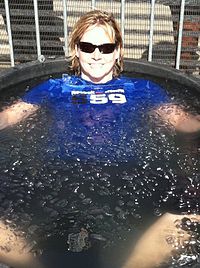
Photo from wikipedia
The goal of the study was to evaluate the effect of an aerobic exercise bout followed by ice-water immersion or recovery at room temperature on the redox state, activities of… Click to show full abstract
The goal of the study was to evaluate the effect of an aerobic exercise bout followed by ice-water immersion or recovery at room temperature on the redox state, activities of selected lysosomal enzymes and activity of α1-antitrypsin (AAT) in the blood of healthy sportsmen. Eleven amateur football players aged 18 were randomly assigned to two similar 30-min aerobic cycle ergometer tests followed by a recovery at room temperature (20 °C; Experiment 1) or ice-water immersion (3 °C, 5 min; Experiment 2). Peripheral blood was collected three times during both study experiments: before (baseline), as well as 20 and 40 min after the recovery or immersion. The concentrations of thiobarbituric acid reactive substances in blood plasma (plTBARS) and erythrocytes (erTBARS) were measured. The erythrocytic activities of superoxide dismutase (SOD), catalase (CAT) and glutathione peroxidase (GPx) were also determined. In the blood serum, the activities of acid phosphatase (AcP), arylsulphatase (ASA), cathepsin D (CTS D) and AAT were evaluated. The activities of AcP, ASA, CTS D and AAT changed similarly during both experiments. The GPx activity decreased 40 min after the exercise/recovery compared to the baseline activity and was lower than 40 min after the exercise/immersion. The exercise followed by the recovery or immersion had no significant effect on the serum lysosomal and AAT activities in the studied men. The exercise/recovery reduced the hydrogen peroxide concentration in the men's erythrocytes, however the exercise/immersion demonstrated the opposite effect.
Journal Title: Cryobiology
Year Published: 2017
Link to full text (if available)
Share on Social Media: Sign Up to like & get
recommendations!